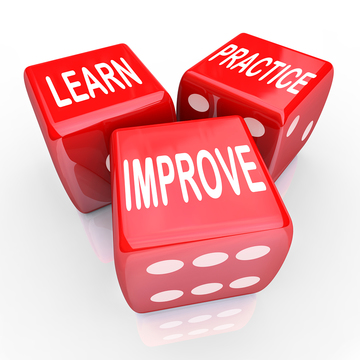
Do you learn best from success or failure? Upon reflection, most people will say failure. The question is what do you learn? Mistakes can cause all kinds of heartburn, fear, and frustration. But they are a fact of life. When you make a mistake, you are really faced with two choices: 1) You can relive the event, wallow in it, and generally depress yourself, or 2) You can take a step back and become a student of the error. Now, you might be thinking, “Why would I want to relieve something that went wrong?” Here’s the secret . . . Those who thrive in any environment, develop the habits of mind to move past the emotion and move on to the opportunities for learning.
At one point in a presentation last week, for instance, I got a little too glib. In the process, I came off as a smart-ass rather than an expert. I won’t share what I said. But the second I said it, I watched the audience begin to shut down. I quickly apologized for the goof, but the damage had been done. After the presentation, my first inclination was to beat myself up for going too far in trying to be funny. Then I took a step back and reflected. Ninety-nine percent of the presentation had gone very well. I just need to more careful in my attempts to be amusing.
Now, changing habits of mind requires practice and determination. Sadly, most of us have gotten very good at wallowing in what goes wrong. That’s human nature. The best thinkers don’t despair, however. Instead, they become students of error, determined to learn from what goes wrong. How? Here are three things I’ve learned from interviewing lots of them:
Take time to reflect – When you make a mistake or something goes wrong, learn to interrupt your pattern of worry and examine the incident in perspective. With few exceptions, the mistakes we make are never as bad as our emotions make them out to be. Mark Twain once said, “My life has been filled with terrible misfortunes, most of which have never happened.”
Discuss the error with others – Proverbs 16:18 says “Pride goeth before the fall.” The best decision makers swallow their pride when things go wrong and ask for help. Call a couple of friends. Take a colleague to lunch. Explain the situation, the outcome, and ask what they would have done differently. Ask them to be frank. As the old saying goes, “In adversity, there is opportunity” . . . to learn. Chances are, by the way, they’ve made similar mistakes.
Learn from others’ mistakes – Many of those I’ve interviewed read lots of biographies. They glean insights from those who have come before. I’ve spent the past year interviewing small business owners. One of the questions I always ask is, “What’s the biggest mistake you’ve made and what did you learn from it?” You can do this same sort of thing with the leaders and decision-makers you admire. I think you’ll be surprised at how open most will be. With each mistake, we face a choice. On one hand, we can dwell on what went wrong and brace ourselves for the next mistake. On the other hand, we can compartmentalize our emotions and seek out the learning opportunity. One reinforces negative beliefs. The other will make us better decision-makers.
